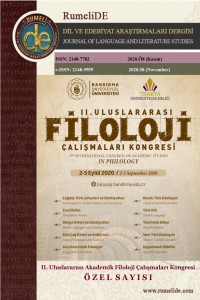Abstract
Günümüzde birçok çeviri türü bulunmaktadır: senkronize, konferanslarda ardışık, radyo ve televizyon yayınları (medya), kaset kayıtları vb. Ve bu bağlamda, modern dünyada iyi bir çevirmenin rolü her zaman ön planda olacaktır. Kültürel, ekonomik ve politik bağların gelişmesi ile bağlantılı olarak Rusça-Türkçe ve Türkçe-Rusça çeviri çalışmalarına olan ilgi gittikçe artmaktadır. Aynı zamanda, Rus dilini öğrenmek Bağımsız Devletler Topluluğu ülkelerinin temsilcileriyle iletişim kurmak için fırsat vermektedir. Dilsel olmayan bir ortamda Rus Dili öğretiminde (özellikle Türkiye’de), önemli faktörler göz önünde bulundurulmalıdır. Bu, her şeyden önce, eğitim sistemi için bir zihniyet meselesidir. Öğrencilerin kültürel birikimlerinin artırılması ve ulusal eğitim sisteminin özelliklerine ilişkin bilgilerin uygulamalı olarak öğrencilere aktarılması, eğitim sürecinin iyileştirilmesine katkıda bulunacaktır. Ağrı İbrahim Çeçen Üniversitesi Fen Edebiyat Fakültesi Rus Dili ve Edebiyatı Bölümü öğretim elemanları olarak, bütün “Türkçe-Rusça” ve “Rusça-Türkçe” çeviri derslerinde, Türk öğrencilerin karşılaştıkları bazı zorlukları gözlemlemekteyiz. Zorlukların üstesinden gelmek için öncelikle nedenleri tanımlamakta fayda vardır. Aşağıda bu nedenlerden bazıları sıralanmıştır: Türk öğrencilere, Rus Dili ve Edebiyatı eğitimi verilmesi sürecinde, “Türkçe-Rusça” ve “Rusça-Türkçe” çeviri derslerinin öğretimi açısından irdelendiğinde, en zor alanlardan birinin dilbilgisi olduğu unutulmamalıdır. Çünkü Türkçedeki kelimelerin çoğu belirsizdir ve bu kelimeler Rus dilinde, her biri birbirinden tamamen farklı, birkaç anlama karşılık gelmektedir. Bu çalışmada, Fen-Edebiyat Fakültesi Rus Dili ve Edebiyatı Bölümü'nde fonoloji, Türkçe-Rusça ve Rusça-Türkçe çeviri, kültürlerarası iletişim, Rus-Türk Kültür diyaloğu ve diğer disiplinlerin öğretiminde yer alan özellikler vurgulanmıştır. Ağrı İbrahim Çeçen Üniversitesi örneğinde Türkçe-Rusça, Rusça-Türkçe çeviri dersleri, derslerde gözlemlenen zorluklar ve çözüm önerileri çalışmanın amacını oluşturmaktadır.
Keywords
çeviri Ağrı İbrahim Çeçen Üniversitesi Kültürlerarası İletişim Türk ve Rus dillerinin özellikleri milli ve kültürel özellikler
References
- Bondarko A.V. (1971) Vid i vremya russkogo glagola (znaçeniye i upotrebleniye), Prosveşeniye: Moskva. 239 S.
- Sonnur A. (2015) Türkiye'de Rus dilini öğretme tarihi (Anadolu Üniversitesi örneğinde). Samara bilim dergisi. № 1 (10), 181 S.
On Turkish-Russian, Russian-Turkish text translation courses in the example of Agri İbrahim Cecen University
Abstract
There are many types of translations available today: synchronized, sequential in conferences, radio and television broadcasts (media), cassette recordings, etc. And in this context, the role of a good translator in the modern world will always be at the forefront. Russian-Turkish and Turkish-Russian translation studies are growing in connection with the development of cultural, economic and political ties. At the same time, learning the Russian language gives the opportunity to communicate with representatives of the countries of the Commonwealth of Independent States. In teaching the Russian language in a non-linguistic environment (especially in Turkey), important factors must be considered. This is, above all, a matter of mindset for the education system. Increasing the cultural accumulation of students and practical transfer of information about the characteristics of the national education system to students will contribute to the improvement of the educational process. As lecturers of the Faculty of Letters and Sciences of Ağrı İbrahim Çeçen University we observe some of the difficulties faced by Turkish students in all Turkish-Russian and Russian-Turkish translation courses First, it is useful to identify the reasons for overcoming difficulties. Some of these reasons are listed below:. To overcome difficulties, First it is useful to identify the reasons. Below are some of these reasons: It should not be forgotten that one of the most difficult areas is grammar when it is analyzed in terms of teaching "Turkish-Russian" and "Russian-Turkish" translation lessons in the process of teaching Russian Language and Literature to Turkish students. Because most of the words in Turkish are ambiguous, and these words correspond to several meanings in the Russian language, each completely different from each other. In this study, the characteristics of phonology, Turkish-Russian and Russian-Turkish translation, intercultural communication, Russian-Turkish cultural dialogue and teaching of other disciplines in the Department of Russian Language and Literature of the Faculty of Arts and Sciences are emphasized. In the case of Ağrı İbrahim Çeçen University, Turkish-Russian, Russian-Turkish translation lessons, the difficulties observed in the lessons and the solution suggestions constitute the aim of the study.
Keywords
Translation Agrı Ibrahim Çeçen University ntercultural Communication characteristics of Turkish and Russian languages national and cultural characteristics
References
- Bondarko A.V. (1971) Vid i vremya russkogo glagola (znaçeniye i upotrebleniye), Prosveşeniye: Moskva. 239 S.
- Sonnur A. (2015) Türkiye'de Rus dilini öğretme tarihi (Anadolu Üniversitesi örneğinde). Samara bilim dergisi. № 1 (10), 181 S.
Details
| Primary Language | Turkish |
|---|---|
| Subjects | Linguistics |
| Journal Section | World languages, cultures and litertures |
| Authors | |
| Publication Date | November 21, 2020 |
| Published in Issue | Year 2020 Issue: Ö8 |


